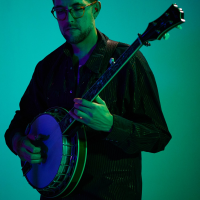Home » Jazz Musicians » Joe Troop
Joe Troop
With a new president, vaccines rolling out, and massive cultural changes underway, most of us are looking for a moment just to breathe. But not Joe Troop. As the GRAMMY-nominated bandleader for Che Apalache, Troop didn’t stop even for a second as COVID ravaged a whole year’s worth of performance dates. Instead he took to the rural roads of North Carolina and the American South, pushing to get out the vote among rural progressives and interviewing those most affected by Trump’s horrific policies. After a year learning direct action from stalwart progressive organizers, he’s channeling that energy into his first proper solo album. Borrowed Time, out August 20 on Free Dirt Records, may feature big names like Béla Fleck (who produced Che Apalache’s GRAMMY-nominated album), Abigail Washburn, Tim O’Brien, and Charlie Hunter, but the powerful songwriting speaks for itself and is designed to push listeners out of their comfort zones. This is the kind of activism that got Pete Seeger blacklisted, and Troop’s no stranger to controversy, having been chased off stages and threatened for his radical songs. But as an openly gay man growing up playing bluegrass in the South, Troop never had a choice, he had to stand up for what he believed in, no matter the consequences. With Borrowed Time, Troop is doing much more than just bringing together a group of great musicians to embody songs of protest, he’s building on his community of activists and organizers to tell his own story and the stories of those whose voices have been pushed down. “I’m just cutting my teeth as an organizer,” Troop says, “but being in the presence of someone like my mentor Presidente Baldemar Velasquez of the Farm Labor Organizing Committee is an amazing honor and an opportunity to learn how to do this kind of work without demonizing the opposition, to leave an open door for dialogue.”
In early 2020, Joe Troop was flying high. After a trip to the GRAMMYs in Los Angeles where Che Apalache was nominated for Best Folk Album, he had just embarked on a major US tour when COVID tore it all down. His bandmates were nearly trapped in the country and he watched as every gig collapsed. Instead of wallowing though, he threw himself into a year of direct action and protest by starting the “Pickin’ for Progress” web series that helped get out the vote in rural America during the most important election of our lives. These videos introduced him to important mentors, like Velazquez and Dreama Caldwell, an impossibly brave Black woman who ran for county commissioner in Alamance County, North Carolina on a personal mission to reform cash bail. This work also taught Troop that true activism should last longer than the span of one terrible president. “Activism is not a thing you do just during an election cycle,” Troop says. “It’s a long haul orientation towards trying to envision a brighter future that is far greater than electoral politics.” In that spirit, Troop’s noticed throughout 2021 that the activists he knows and works with are all working harder than ever, even with a more progressive president. “The deeper you go,” he says, “the more strategic you become, and the more you look towards the bigger picture. Now the organizers are laying the foundation for years to come.” Moving beyond Trump, Troop’s activism now is expressly tied to music and travel. He’s collaborating with Indigenous filmmaker Roderico Yool-Diaz of Iximche Media to produce a documentary on Velazquez and to revisit the Arizona/Mexico borderlands that are ground zero for America’s brutal treatment of immigrants. These upcoming films will also feature the work of popular videographers GemsonVHS and WesternAF. This work contextualizes the music of his new album, shows the roots of the music that inspires him, and amplifies the voices of those that created this music.
Read moreTags
Joe Troop's Whirlwind at The Evening Muse

by Mark Sullivan
Joe Troop's Whirlwind The Evening Muse Charlotte, NC April 23, 2025 Joe Troop grew up in the tobacco town of Winston-Salem, North Carolina. However, a year of study abroad in Spain led him to move to Argentina, where he lived for several years. He absorbed Latin music until it became his second language. The banjo is his primary instrument, but his bluegrass background has been thoroughly blended with his experience in World Music. He opened ...
Continue Reading









